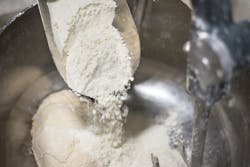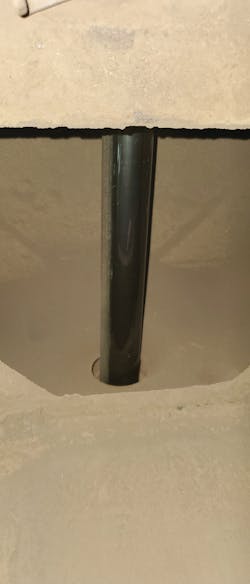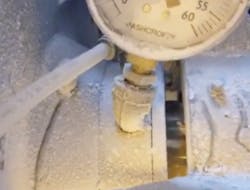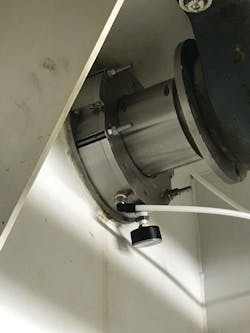Steel, candy and bread: The importance of reliable seal technology
Powder, dust, flour, spices, chocolate and ingredients for pills and tablets — what do they have in common? They are critical to the processes in which they are used, and they are notoriously difficult to contain. With the slightest movement of air or the shifting of a shaft, these materials will not remain in the location or container in which they are required to be.
The results? Wasted product, housekeeping issues, personnel safety risks, health risks and potential contamination. This article details three case studies that explain how selecting the ideal seal technology solved problems with poppet valves, rotary airlocks and mixers in the following applications:
- Steel manufacturing
- Candy production
- Bread dough mixing
Steel
In a steel plant, dust is produced and must be managed. According to a Lung Institute blog post, “Breathing metal dust for any duration of time can have a negative effect on the lungs, but it can be particularly dangerous if you do so over an extended period of time.” If inhaled, it can lead to siderosis, silicosis or black lung.
For this reason, containing steel dust is important for the welfare of all employees. As a side benefit for the company, steel dust can be bagged and sold for recycling. This saves the company money and lowers its carbon footprint. However, managing the movement and bagging of this dust introduced its own challenges for two NUCOR Steel facilities.
The problem
Two NUCOR Steel plants (Crawfordsville, Indiana and Gallatin, Kentucky) send their steel dust to a baghouse. An air/dust handling system moves the dust created in manufacturing to a separate building (the baghouse) where it is captured and sold to another plant that processes the metals out of the dust. This system has several poppet valves and dampers, and they became a leakage source.
The packing, which was used to seal the poppet valve, was ineffective. The valve stuffing boxes would become filled with the dust that leaked past the packing set. Once per week, the team had to vacuum out the boxes and adjust the packing. The packing was replaced once per month. However, it could have been changed out once per week if they had the manpower to do so. The multiple costs and losses for the team were:
- Lost recyclable dust
- Time to replace the packing
- New packing every month
- Housekeeping time to clean out every valve box
- The new packing solution
Needing a better way to seal the poppet valves, the team consulted with a manufacturer and a copper packing ring was installed first. The copper packing ring centers the rod in the stuffing box, which allows the packing to seal properly. It also acts as a wiper when the rod cycles to keep the abrasive dust away from the packing.
Eventually, however, the team also changed the packing it was using. They replaced it with a V-packing set made up of a special blend of polytetrafluoroethylene, carbon and molybdenum sulfide. With this hearty packing in place and the copper packing ring wiping the rod to keep the abrasive dust away from the V-sets vast improvements were measured. These included:
- Eliminating the need to vacuum the stuffing boxes
- Mitigating the dust leakage past the packing
- Increasing packing life (operating nine months and counting in Crawfordsville, and five months in Gallatin)
- Eliminating downtime and labor costs for packing replacements and the costs of housekeeping
- Decreasing product loss
Candy production
Unlike the whimsical world of Willy Wonka, operations in candy factories must overcome many challenges … without the benefit of magic. One challenge is moving fine dextrose throughout a candy manufacturing facility in the eastern U.S.
The problem
A rotary air lock used as a feeder moves the dextrose. It meters the dextrose and sends it to different mixers that make peanut butter used in the candy. This sounds simple, except the team had a major problem with dextrose leakage.
The lip seals used on the air lock feeder only lasted a few weeks before they started leaking. The leaks caused major housekeeping issue. The dextrose literally went everywhere.
Besides the mess that the leaking dextrose caused, it created safety issues, too. If the dextrose powder got moisture in it, it became very slippery. Simply being exposed to the humidity in the air could cause this problem.
Finally, wasted dextrose meant wasted money. Replacing failed lip seals every few weeks was also a financial drain. The dextrose being swept or wiped up throughout the facility and failed lip seals in the trash became a multifaceted problem.
The air seal solution
The facility had to find a solution. The team learned about an air seal that is noncontacting, so it does not wear. It uses an air wedge to block any powder or slurry and keeps the material where it is supposed to be.
This seal has been operating leak-free for four months. With this success, the candy producer is in the process of converting several other rotary air locks that perform the same job within the facility from lip seals to air seals.
Bread dough mixing
Dry ingredients are just tough to contain, and dry bread ingredients are no exception. Just turn a standard, domestic kitchen mixer on too high and see how much flour remains in the bowl.
The problem
In one bakery, dry powder leakage along a mixer’s shaft caused the following problems:
- Product loss
- Premature bearing failure
- Housekeeping issues
- Frequent packing replacement in the mixer
- Shaft wear from the packing
- Liability issues related to safety
As the granular ingredients embedded within the compression packing used to seal the mixer, the packing rubbed against the shaft like sandpaper. The results? Worn shafts and packing that was frequently replaced, often one each month. The team conducted maintenance nearly every weekend when production was halted and the plant was closed.
In addition, flour and other dry ingredients fell to the floor, causing the need for constant cleaning for safety and sanitation reasons. The risk of slips and falls would have been ever-present without this concerted cleaning effort. In addition, contamination issues could have resulted. The time and costs for this were high.
The no-maintenance seal solution
The team at the bakery decided to try a new air seal technology to solve the mixer issue. The air seal consumed very little air, and completely sealed the mixer, with no contact to wear the shaft.
Best for the team, the new seal eliminated weekend maintenance for worn shafts and to replace packing. The new technology required no maintenance and has been operating successfully.
David Brewer is regional manager, Atlantic Region, for Sealing Equipment Products Company (SEPCO). Before this, he served four years in the U.S. Navy and received three Letters of Commendation. He has served many industries including pulp and paper, chemical processing, food and beverage, power generation, textile and waste treatment. He graduated from Lees McRae College.
Zach Nepa is a regional manager for SEPCO. He has more than four years in the sealing industry and graduated with a B.A. from State University of New York at Binghamton.
Terry Roberts is the Midwest regional manager for SEPCO. He has worked in the fluid sealing industry for 20 years. In his role with SEPCO, he provides training, sales support and solutions to channel partners and their customers.






